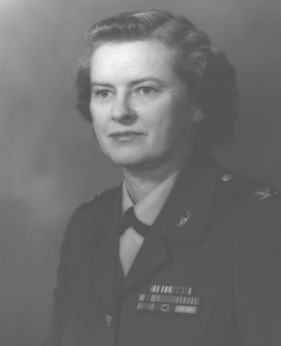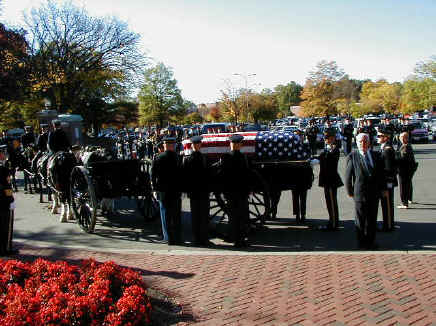Colonel Bettie Morden (1921-2001)

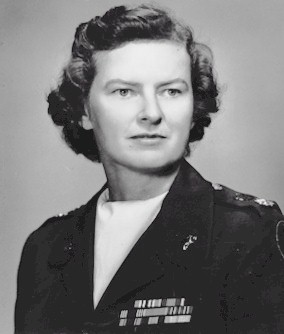
Colonel (Retired) Bettie J. Morden died of breast cancer on Friday, October 12, 2001 at her home in Arlington, Virginia. She was a pioneer Army woman, acclaimed historian/writer and tireless supporter of the Women’s Army Corps Museum (now the Army Women’s Museum). Colonel Morden has been described by Army senior leaders past and present as the “best of the best”.
A Port Huron, Michigan native, Colonel Morden was born in 1921. She graduated from high school in 1939 and from Cleary Business College, Ypsilanti, Michigan in 1940. She served as a corporate office secretary before entering the Army.
On October 14, 1942, she was among the first to enlist in the new Women’s Army Auxiliary Corps (WAAC). She received basic and administrative training at the First WAAC Training Center, Fort Des Moines, Iowa. Colonel Morden served throughout the remainder of the war at the Third Women’s Army Corps (WAC) Training Center, Fort Oglethorpe, Georgia. She was promoted rapidly, and served as the First Sergeant of the Headquarters Company, South Post, Fort Oglethorpe.
Upon discharge from the Army in November 1945, she entered Columbia University and earned both a Bachelors (1949) and a Masters (1950) degree in English.
She entered the U.S. Army Reserve in September 1949 and was commissioned a Second Lieutenant, WAC in 1950.
Colonel Morden returned to active duty as a First Lieutenant in 1952. She held a number of important command and staff assignments during the twenty-one years on active duty. Her assignments included the National Security and Army Security Agencies where she was a personnel officer. She also was a personnel staff officer at the Headquarters, Defense Language Institute, Washington, DC.
She commanded WAC detachments at Fort Riley, Kansas, Heidelberg and Pirmasens, Germany. Later she served as battalion commander of the WAC Training Battalion at the WAC Center at Fort McClellan, Alabama 1965-1966. Her next assignment took her to Washington, DC, where she was first the executive officer, Office of the Director, WAC, and then Deputy Director, WAC for two WAC directors, Brigadier General Elizabeth P. Hoisington and Brigadier General Mildred I. C. Bailey from 1966 until 1972. She retired on December 31, 1972.
Colonel Morden was recalled to active duty in 1974 to write, “The Women’s Army Corps 1945-1978” for the U.S. Army Center of Military History. The book was published in 1990 and won the Distinguished Book Award from the Society of Military Historians in 1991. Other recipients of this prestigious award include John Keegan and Russell Weigley. She reverted to retired status again in 1982 but continued as an Associate Staff Historian at the Center of Military History until the book was published.
“Retirement” was a misnomer for Colonel Morden’s active life after leaving Army service. She supported women veterans in many ways, often personally assisting women in need. She was the president of the WAC Museum Foundation for over 30 years. During this time, she led a successful campaign to raise funds for the WAC Museum building at Fort McClellan, and several years later, for a sizeable addition. This building and the addition were built solely with private funds.
When the decision was made to close Fort McClellan, Colonel Morden was instrumental in the successful drive to relocate the museum. Opened on May 11, 2001 at Fort Lee (Petersburg), Virginia, the U.S. Army Women’s Museum is a modern 13,000 square foot facility with exhibits representing all Army women. This impressive museum is truly a testament to her leadership and dedication.
Although she knew that she had inoperable cancer, she was determined to see her dream through to completion. Five weeks after the Museum’s dedication, Colonel Morden resigned from the Foundation because of declining health.
Colonel Morden’s accomplishments are impressive, but the woman was even more so. She was an outstanding historian and one of the leading experts on women in the Army. She was a great supporter of service women and a strong advocate of increased opportunities for women in the military.
She was a helpful advisor and mentor; she constantly encouraged research and writing about military topics. She was a warm and caring friend to so many who came in contact with her.
Colonel Morden was never too busy to discuss an issue or answer a question. She almost always had an answer or could direct you to the source that would provide the answer. Eschewing recognition, she invariably turned praise aside to others. She was a very private person who preferred not to be in the spotlight. Yet, she was an incredibly capable leader who elicited an inspired response, often without the person knowing that he or she had even been led. She handled controversy with quiet, calm determination to see the issue through to a fair and reasonable conclusion.
Colonel Morden was a patriot, a leader, and an outstanding example of one whose life epitomized service to our country and to others. We will miss her greatly. Her death leaves a void that cannot be filled.
She was a graduate of the WAC Officers’ Advanced Course (of which she was named Outstanding Graduate), Command & General Staff College at Fort Leavenworth, Kansas, and the Army Management School at Fort Belvoir,
Virginia.
Among her numerous decorations and honors were the Distinguished Service Medal, Legion of Merit, Joint Services Commendation Medal and Army Commendation Medal with Oak Leak Cluster.
Funeral services were held at the Fort Myer Old Post Chapel on Monday, November 5, 2001 at 9 AM. She was buried with full military honors at Arlington National Cemetery.
Memorial contributions may be made to the United States Army Women’s Museum Foundation (formerly WAC Foundation), P.O. Box 5030, Fort Lee, Virginia 23801-0030 or to the Hospice of Northern Virginia, 6400 Arlington Boulevard, Suite 1000, Falls Church, Virginia 22042.
(This biography is based almost entirely on an excellent description of Colonel Morden’s accomplishments by Pat Jernigan.)
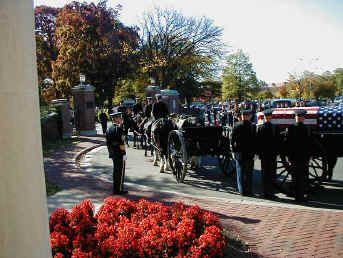
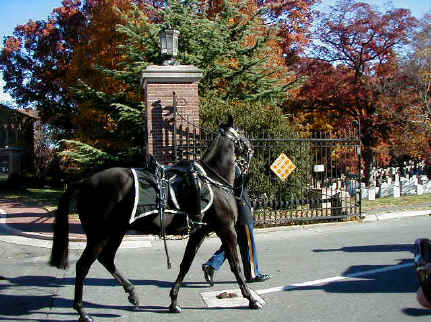
Michael Robert Patterson was born in Arlington and is the son of a former officer of the US Army. So it was no wonder that sooner or later his interests drew him to American history and especially to American military history. Many of his articles can be found on renowned portals like the New York Times, Washingtonpost or Wikipedia.
Reviewed by: Michael Howard

